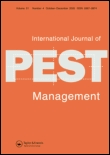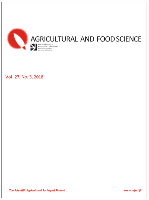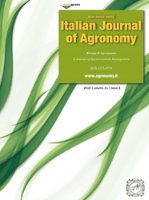
SOUTH AFRICAN JOURNAL OF ENOLOGY AND VITICULTURE
Scope & Guideline
Pioneering Discoveries in Enology and Horticulture
Introduction
Aims and Scopes
- Viticulture Research:
The journal emphasizes research on grapevine cultivation techniques, including irrigation, soil management, and pest control, with a focus on sustainable practices. - Enological Studies:
It covers various aspects of wine production, including fermentation processes, sensory evaluation, and the chemical composition of wines. - Environmental Impact Assessments:
Research addressing the environmental implications of viticulture practices, including water use, waste management, and the effects of climate change on grape production. - Disease and Pest Management:
The journal publishes studies on the identification and management of diseases and pests affecting grapevines, contributing to improved vineyard health. - Innovative Technologies in Viticulture and Enology:
It includes papers on technological advances in grapevine research, winery practices, and the use of data-driven approaches to enhance production efficiency.
Trending and Emerging
- Sustainable Agricultural Practices:
There is an increasing emphasis on research related to sustainable irrigation methods, wastewater management, and the use of organic materials in vineyard practices. - Climate Change Adaptation Strategies:
Recent publications highlight the impact of climate change on viticulture and explore adaptive strategies, indicating a proactive approach to future challenges in grape production. - Advanced Analytical Techniques:
The use of sophisticated analytical methods, such as metagenomics and functional data analysis, is trending, showcasing a move towards data-driven insights in grape and wine research. - Integrated Pest Management (IPM):
Research focusing on IPM strategies is gaining traction, reflecting a shift towards environmentally friendly pest control methods that minimize chemical usage. - Health Aspects of Wine:
Emerging studies examine the health benefits and bioactive compounds in wine, indicating a growing interest in the nutritional and therapeutic properties of grape products.
Declining or Waning
- Traditional Pest Control Methods:
There has been a noticeable reduction in studies focusing on conventional pest control methods, possibly due to a shift towards integrated pest management and sustainable practices. - Basic Viticultural Techniques:
Research papers that cover fundamental techniques in viticulture seem to be waning, as the journal increasingly emphasizes innovative and sustainable practices. - Historical Wine Production Techniques:
There is a decreasing trend in publications exploring historical or traditional wine production methods, indicating a shift towards modern techniques and scientific advancements. - Single-varietal Studies:
Papers examining individual grape varieties in isolation are becoming less common, as there is a growing interest in multi-varietal studies and blends that reflect complex interactions. - General Reviews on Viticulture:
General reviews that lack specific focus or new insights are less frequently published, indicating a preference for more targeted and impactful research contributions.
Similar Journals

Ciencia e Tecnica Vitivinicola
Exploring the Future of Wine Production and Horticultural PracticesCiencia e Tecnica Vitivinicola is a premier open-access journal dedicated to the fields of Food Science and Horticulture, published by ESTACAO VITIVINICOLA NACIONAL in Portugal. Since its inception in 2008, this journal has provided a vital platform for researchers, professionals, and students focused on advancing the scientific study of viticulture and wine technology. With a significant commitment to open access since 2014, Ciencia e Tecnica Vitivinicola encourages widespread dissemination of knowledge, thus enhancing collaboration across the global scientific community. In 2023, it achieved a commendable ranking within the Q3 and Q2 quartiles for Food Science and Horticulture, respectively, demonstrating its impact and relevance in the academic landscape. Furthermore, with Scopus ranking it at 45 out of 115 in Horticulture and 208 out of 389 in Food Science, the journal continues to uphold high standards of scholarly excellence. With its scope encompassing innovative research, technological advancements, and practical applications in viticulture, Ciencia e Tecnica Vitivinicola is an indispensable resource for those passionate about the future of wine production and horticultural practices.

VITIS
Unveiling the Secrets of Grape Growth and QualityVITIS is a distinguished journal published by the Julius Kuhn Institute (JKI), based in Germany, dedicated to advancing the field of viticulture and enology. With a long-standing history dating back to 1981, VITIS serves as a vital platform for researchers, professionals, and students alike, focusing on critical insights and innovations related to vine genetics, cultivation, and grape quality. Although the journal operates under a traditional access model, its commitment to publishing high-quality, peer-reviewed research contributes to its relevance, as indicated by its current rankings of Q4 in Genetics and Q3 in Horticulture for 2023. Furthermore, with its Scopus rankings placing it within the agricultural and biological sciences community, VITIS plays an essential role in disseminating vital knowledge to enhance viticultural practices. Researchers and practitioners are encouraged to explore the breadth of studies published, contributing to the ongoing dialogue in horticulture and plant genetics.

OENO One
Connecting Researchers to the Heart of Wine Science.OENO One, published by the International Viticulture and Enology Society (IVES), stands as a leading open-access journal dedicated to advancing the science of viticulture and enology since its inception in 2015. Operating out of France, this innovative journal is pivotal in disseminating high-quality research that impacts the fields of Food Science and Horticulture, evidenced by its notable category quartiles—Q2 in Food Science and Q1 in Horticulture as of 2023. With Scopus rankings placing it in the 82nd percentile in Horticulture and the 62nd percentile in Food Science, OENO One delivers timely insights and robust findings to its readers, fostering collaboration and knowledge exchange among researchers, professionals, and students alike. The journal embraces a forward-thinking approach, featuring research from various aspects of wine production, quality assessment, and viticultural practices, making it an essential resource for anyone involved in these disciplines.

POTATO RESEARCH
Fostering advancements in crop science and food systems.POTATO RESEARCH is a prestigious journal dedicated to advancing the scientific understanding of potato cultivation and its wider implications in the fields of agronomy, crop science, and food science. Published by Springer in the Netherlands, this journal boasts an impressive impact factor and ranks in the Q2 category for both Agronomy and Crop Science, as well as Food Science in 2023, affirming its significant contribution to these disciplines. With over five decades of research converged from 1970 to 2024, POTATO RESEARCH serves as a vital platform for researchers, professionals, and students interested in the latest findings and innovations that affect potato production and processing. Although it is not an open-access journal, it remains a crucial resource for those dedicated to enhancing agricultural sustainability and food security. For inquiries or submission details, please refer to their office located at Van Godewijckstraat 30, 3311 GZ Dordrecht, Netherlands.

Revista de Agricultura Neotropical
Fostering Collaboration in Agricultural ScienceRevista de Agricultura Neotropical, published by UNIV ESTADUAL MATO GROSSO SUL, serves as a pivotal platform for disseminating research in the fields of agronomy and crop science. Since its inception as an open-access journal in 2014, it has been dedicated to promoting innovative research and practical applications within the agricultural sector, specifically tailored to the challenges and dynamics of the tropical agriculture landscape in Brazil and beyond. Although currently positioned in the Q4 quartile of Scopus rankings, and with a modest agricultural science percentile, the journal actively encourages contributions that highlight sustainable agricultural practices, tropical crop management, and emerging technologies in farming. With its commitment to open access, the Revista de Agricultura Neotropical broadens the reach of critical knowledge, making it accessible to researchers, professionals, and students alike, thus fostering a collaborative environment for advancing agri-scientific initiatives.

Romanian Agricultural Research
Fostering Dialogues for Sustainable Agricultural DevelopmentRomanian Agricultural Research is a prominent academic journal dedicated to advancing the field of agricultural science with a specific focus on agronomy and crop management. Published by the NATL AGRICULTURAL RESEARCH & DEVELOPMENT INST in Romania, this journal has established itself as an important resource within its discipline, evidenced by its Q3 ranking in the Agronomy and Crop Science category for 2023. With its ongoing publication since 2008, the journal provides a platform for researchers and professionals to disseminate their findings and share innovative practices that address the challenges faced in agricultural development. Although it operates under a non-open access model, Romanian Agricultural Research commits to rigorous peer-review processes, ensuring the high-quality content that enhances the academic community’s knowledge base. The journal's objective is to foster dialogues surrounding sustainable agriculture, improve crop yield, and contribute to the enhancement of agricultural practices globally. Researchers, professionals, and students will find this journal to be an invaluable repository of knowledge and a catalyst for future agricultural innovations.

INTERNATIONAL JOURNAL OF PEST MANAGEMENT
Advancing sustainable agriculture through innovative pest management research.The INTERNATIONAL JOURNAL OF PEST MANAGEMENT, published by TAYLOR & FRANCIS LTD, is a prestigious academic journal that has established itself as a vital resource in the fields of Agronomy, Crop Science, and Insect Science. With an ISSN of 0967-0874 and E-ISSN 1366-5863, this journal has been disseminating critical research since its inception in 1993 and continues to shape the discourse through to 2024. The journal occupies a significant position in the academic community, currently ranked Q2 in Agronomy and Crop Science and Q3 in Insect Science, based on its impressive Scopus ranks (Agricultural and Biological Sciences: Insect Science rank #33/181; Agronomy and Crop Science rank #109/406). Offering rapid insights into pest management strategies, this journal is essential for researchers, professionals, and students seeking to enhance their understanding of pest dynamics and management practices in an agronomic context. Though it does not provide open access options, its rigorous peer-review process ensures high-quality, impactful publications that contribute significantly to sustainable agricultural practices.

Egyptian Journal of Agronomy
Empowering Agronomists with Insightful ResearchEgyptian Journal of Agronomy, published by the NATL INFORMATION DOCUMENTATION CENT, ACAD SCIENTIFIC RESEARCH & TECHNOLOGY, serves as a pivotal platform for researchers, professionals, and students focusing on various disciplines within the agricultural sciences, including agronomy, soil science, horticulture, and ecology. With an ISSN of 0379-3575 and E-ISSN of 2357-0288, the journal aims to bridge the gap in knowledge and innovation in the field with its comprehensive studies and frameworks. While the journal is currently categorized in low Scopus ranks, indicating immense potential for growth in influence and impact, it remains dedicated to providing quality research and fostering advancements in agronomic practices. Set in Egypt, a hub for agricultural research, the journal is committed to reflecting the regional and global challenges in agriculture. The Egyptian Journal of Agronomy is a vital resource for anyone engaged in the evolving landscape of agricultural science, offering insights that promote sustainable practices and address current issues facing the sector.

AGRICULTURAL AND FOOD SCIENCE
Innovating food science for global food security.AGRICULTURAL AND FOOD SCIENCE is a prestigious journal published by the SCIENTIFIC AGRICULTURAL SOCIETY OF FINLAND, dedicated to advancing knowledge in the fields of agricultural and food sciences. With an ISSN of 1459-6067 and E-ISSN of 1795-1895, this open-access journal has been providing valuable insights and research findings since its inception in 2002. As of 2023, it holds a Q3 ranking in Food Science and is positioned at the 46th percentile within its Scopus category, ranking 210 out of 389 journals in Agricultural and Biological Sciences – Food Science. The journal features contributions from a global network of researchers, covering various topics including sustainable agricultural practices, food safety, and innovative food technologies. Based in Finland, the journal serves as an essential platform for scholars, professionals, and students who are committed to enhancing food security and agricultural productivity through rigorous scientific research. The convergence of interdisciplinary studies from 2004 to 2024 marks a critical evolution in the scope of agricultural and food research, making this journal a vital resource for anyone involved in these dynamic fields.

Italian Journal of Agronomy
Advancing agronomic knowledge for a sustainable future.The Italian Journal of Agronomy is a prestigious, peer-reviewed outlet dedicated to advancing research and scholarship in the field of agronomy and crop science. Published by PAGEPRESS PUBL in Italy, this journal is committed to providing a platform for the dissemination of high-quality research since achieving its Open Access status in 2006. With an ISSN of 1125-4718 and an E-ISSN of 2039-6805, it is recognized for its contribution to the scientific community, boasting a commendable Q2 category ranking in Agronomy and Crop Science as of 2023. The journal's impressive Scopus ranking places it in the 75th percentile within General Agricultural and Biological Sciences and the 69th percentile in Agronomy and Crop Science, reflecting its significant impact and relevance. Covering a wide range of topics relevant to agriculture, from sustainability practices to innovative farming techniques, the Italian Journal of Agronomy serves as an essential resource for researchers, professionals, and students seeking to enrich their knowledge and contribute to the advancement of the agricultural sciences.